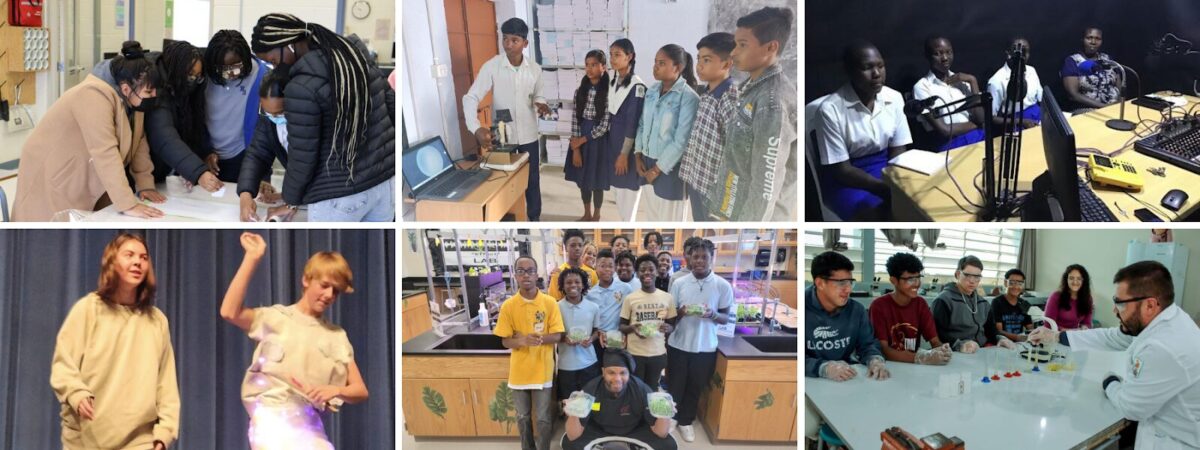
September 3, 2024 | By Lisa Jobson
In the rural city of Odeda in Nigeria, electricity is a luxury rather than a constant. For the Junior Engineers, Technicians & Scientists (JETS) Club at Egba Odeda High School, the challenges this poses to their community served as the basis for a practical, eco-friendly solution: Household Appliances Powered by Solar.
And, when students at Central High School in Kansas City, Missouri, in the United States launched their “Clearing the Air: Taking Our Bathrooms Back” campaign, they weren’t designing for a hypothetical problem. They were tackling an issue plaguing schools across the country—bathrooms filled with the fruit-scented, chemical-laden vapor of e-cigarettes.
Projects like these go beyond academic exercises or simulations. They give students the opportunity to address real-world issues with tangible impacts and provide educators with a flexible framework to help students develop the skills and mindsets necessary to creatively and collaboratively tackle complex challenges in their communities and beyond.
As the 2024-25 Ciena Solutions Challenge call for submission opens, we’re excited to illustrate just a few examples of what this looks like in practice around the world.
“We can do things differently, and we can do different things…Innovation is not only the most sophisticated technologies, sometimes it’s the simplest of things.” – – António Guterres, United Nations Secretary-General”
In reviewing projects for the Ciena Solutions Challenge Sustainability Awards, volunteer judges are not looking for the fanciest or most expensive tools available. Instead, they look for creative use of the digital media and technology available in each context and how these tools are strategically integrated into the actions taken by students.
Principles of “frugal innovation” center on themes such as simplicity, use of existing resources, affordability, and sustainability—ideas exemplified in the Frugal Scopes project from students at Gandhi High Vidyalaya in West Bengal, India, that aims to foster interest in science in large classes.
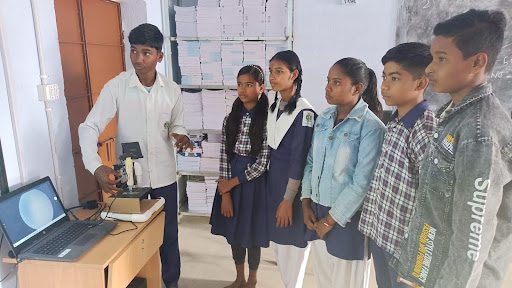
Testing the Frugal Scope on a projector.
The UN calls radio “the universal medium that leaves no one behind” and the Ngora Vegetable Growers project team from Ngora Girls School in Uganda harnessed this potential when they presented on a local radio talk show about how climate change has led to hidden hunger in their community.
“I have never ever thought that I could be a presenter at a radio station and never knew of the technology needed to transmit a radio program.” – Student, Ngora Girls School in Uganda
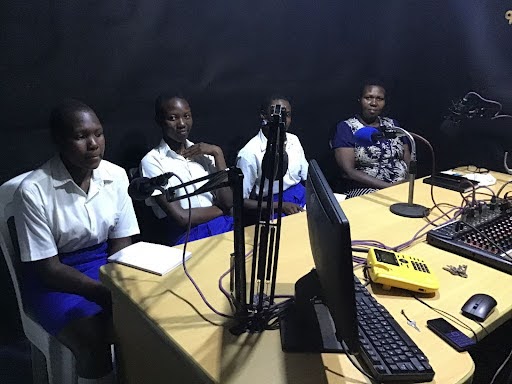
Educator, Grace Olive Musingo Nabuduwa (left), with students from Ngora Girls School at Aisa radio station.
Students at PEI Simpliciano Campolim de Almeida in Brazil saw these interconnections firsthand when their English teacher collaborated with the science teacher to demonstrate chemistry in action for a team project on creating sustainable resin cleaners.
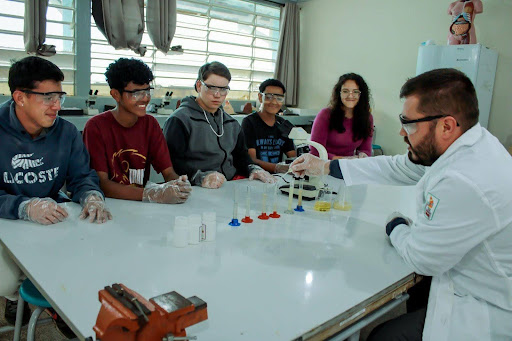
Students at PEI Simpliciano Campolim de Almeida conducting research related to water in the school and surrounding areas.
“In chemistry we did an experiment in which we needed to create a solution that would remove resin from the skin, an experience that was not only cool, but also very necessary, since resin extraction is a very common job where we live, especially among young people.” – Julia S., Student, PEI Simpliciano Campolim de Almeida in Brazil
The student team at The B.E.S.T. Academy (6-12) in Atlanta, Georgia, in the United States showcased this by designing business plans and working together to launch a school-based farmer’s market for their Entrepreneurs Engineering Sustainable Solutions for Food Deserts project.
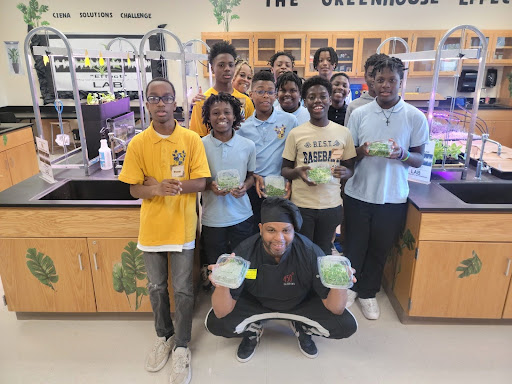
Student grown vegetables on display at B.E.S.T. Academy.
At Notre Dame High School in Ottawa, Canada, Ciena, educator Greg Zapasek facilitates short-term “micro” and “nano” challenges as a way to get started and to help colleagues facilitate “deep learning” experiences and project activities into any schedule.
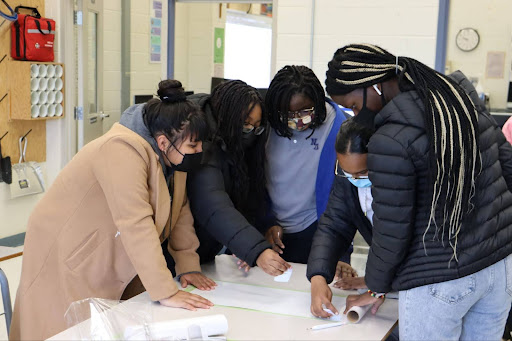
Students at Notre Dame High School collaborating on their Ciena Solutions Challenge project.
Kristie Letter’s Innovation and Design Thinking class at Peak to Peak High School in Colorado in the United States, has grown and evolved over multiple years. After the YouthMADE Festival, where students presented their ideas for an Eco-Justice STEM Fashion Show to students from around the world, student Josephine G. shared, “This is more fun than I’ve ever had doing a school project, and those kids make me want to make it even better.”
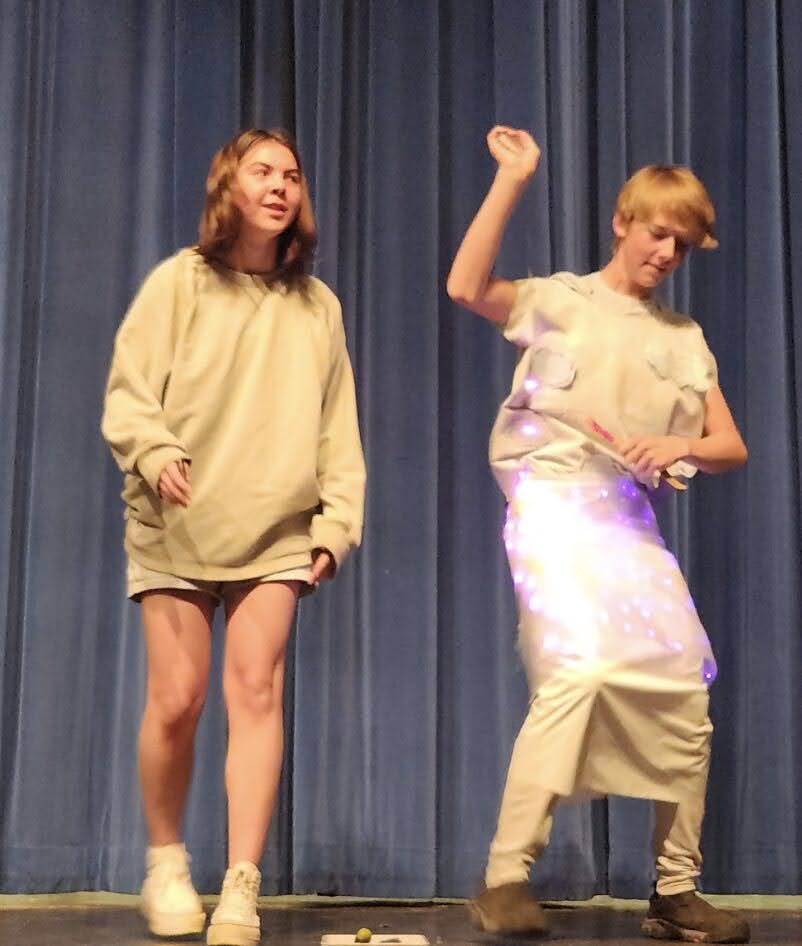
Modeling eco-justice fashion at Peak to Peak High School.
“I was teaching ninth graders who spent most of middle school navigating a pandemic and then a catastrophic local fire—they needed a measure of control over their worlds and the sense that they could be changemakers.” – Kristie Letter, educator at Peak to Peak High School in Colorado in the United States
The after-school Santa Fe Boys and Girls Club Teen Center in Santa Fe, New Mexico, provided an informal space and mentoring support to a group of young leaders who produced a successful podcast series focused on empowering listeners to become agents of change in their communities.
In Victor Okosun’s science classroom at Caleb British International School in Lagos, Nigeria, the desire to help students see real world applications of scientific concepts like evaporation and condensation led to the Vicapot Refrigerator, a student project providing farmers and consumers with a low cost solutions for keeping fruits and vegetables fresh.
“For the brainstorming sessions, I put the students, my team, together, and they were coming up with different ideas that can make the project a great one. So, I had the opportunity to see different crazy, beautiful, powerful ideas, that if there were no limitations, these ideas would have been put to work. So that day was a favorite and wonderful day.” – Victor Okosun, educator at Caleb British International School in Lagos, Nigeria
By Rastee Chaudhry and Barbara Pape